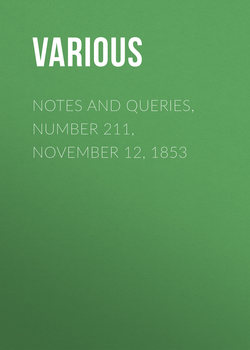Читать книгу Notes and Queries, Number 211, November 12, 1853 - Various - Страница 4
Notes
CONVOCATION IN THE REIGN OF GEORGE II
ОглавлениеOne hears it so often repeated, that Convocation was finally suppressed in 1717, in consequence of the accusations brought by the Lower House against Bishop Hoadley, that it seems worth while noting in correction of this, that though no licence from the Crown to make canons has ever been granted since that time, yet that Convocation met and sat in 1728, and again for some sessions in the spring of 1742, when several important subjects were brought before it; among which was the very interesting question of curates' stipends, in these words:
"VIIth. That much reproach is brought upon the beneficed, and much oppression upon the unbeneficed, clergy, by curates accepting too scanty salaries from incumbents."
and which was really the last subject that was ever brought before Convocation. On Jan. 27, 1742, it was unanimously agreed, that "the motion made by the Archdeacon of Lincoln concerning ecclesiastical courts and clandestine marriages, the qualifications of persons to be admitted into holy orders, and the salaries and titles of curates," should be "reduced into writing, and the particulars offered to the House at their next assembly." But in the next session, on March 5, 1742, the Prolocutor, Dr. Lisle, was afraid to go on with the business before the House, and after "speaking much of a præmunire," and "echoing and reverberating the word from one side of good King Henry's Chapel to the other," the whole was let drop; and Convocation was fully consigned to the silence and the slumber of a century. The whole of these transactions are detailed in a scarce pamphlet, A Letter to the Rev. Dr. Lisle, Prolocutor of the Lower House, by the Archdeacon of Lincoln (the Venerable G. Reynolds).
W. Fraser.
Tor-Mohun.
